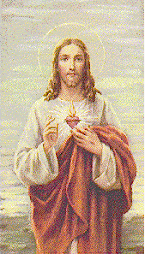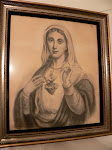
Saint Thérèse de Lisieux (January 2, 1873 – September 30, 1897), or more properly Sainte Thérèse de l'Enfant-Jésus et de la Sainte Face ("Saint Thérèse of the Child Jesus and of the Holy Face"), born Marie-Françoise-Thérèse Martin, was a Roman Catholic Carmelite nun who was canonized as a saint, and is recognized as a Doctor of the Church, one of only three women to receive that honor. She is also known by many as The Little Flower.
Thérèse is known for her "Little Way." In her quest for sanctity, she realized that it was not necessary to accomplish heroic acts, or "great deeds", in order to attain holiness and to express her love of God. She wrote,
"Love proves itself by deeds, so how am I to show my love? Great deeds are forbidden me. The only way I can prove my love is by scattering flowers and these flowers are every little sacrifice, every glance and word, and the doing of the least actions for love."
"Love proves itself by deeds, so how am I to show my love? Great deeds are forbidden me. The only way I can prove my love is by scattering flowers and these flowers are every little sacrifice, every glance and word, and the doing of the least actions for love."
This "Little Way" also appeared in her approach to spirituality:
"Sometimes, when I read spiritual treatises, in which perfection is shown with a thousand obstacles in the way and a host of illusions round about it, my poor little mind soon grows weary, I close the learned book, which leaves my head splitting and my heart parched, and I take the Holy Scriptures. Then all seems luminous, a single word opens up infinite horizons to my soul, perfection seems easy; I see that it is enough to realize one's nothingness, and give oneself wholly, like a child, into the arms of the good God. Leaving to great souls, great minds, the fine books I cannot understand, I rejoice to be little because 'only children, and those who are like them, will be admitted to the heavenly banquet'."
"Sometimes, when I read spiritual treatises, in which perfection is shown with a thousand obstacles in the way and a host of illusions round about it, my poor little mind soon grows weary, I close the learned book, which leaves my head splitting and my heart parched, and I take the Holy Scriptures. Then all seems luminous, a single word opens up infinite horizons to my soul, perfection seems easy; I see that it is enough to realize one's nothingness, and give oneself wholly, like a child, into the arms of the good God. Leaving to great souls, great minds, the fine books I cannot understand, I rejoice to be little because 'only children, and those who are like them, will be admitted to the heavenly banquet'."
Passages like this have left Thérèse open to the charge that hers is an overly sentimental and even childish spirituality. Her proponents counter that she sought to develop an approach to the spiritual life that was understandable and imitable by all who chose to do so, regardless of their level of sophistication or education.
This is evident in her approach to prayer:
"For me, prayer is a surge of the heart; it is a simple look turned toward Heaven, it is a cry of recognition and of love, embracing both trial and joy; in a word, something noble, supernatural, which enlarges my soul and unites it to God.... I have not the courage to look through books for beautiful prayers.... I do as a child who has not learned to read, I just tell our Lord all that I want and He understands."
"For me, prayer is a surge of the heart; it is a simple look turned toward Heaven, it is a cry of recognition and of love, embracing both trial and joy; in a word, something noble, supernatural, which enlarges my soul and unites it to God.... I have not the courage to look through books for beautiful prayers.... I do as a child who has not learned to read, I just tell our Lord all that I want and He understands."
Thérèse's final years were marked by a steady decline that she bore resolutely and without complaint. On the morning of Good Friday, 1896, she began bleeding at the mouth due to a pulmonary hemoptysis; her tuberculosis had taken a turn for the worse. Thérèse corresponded with a Carmelite mission in what was then French Indochina, and was invited to join them, but because of her sickness, she could not travel. In July 1897 she was moved to the monastery infirmary, where she died on September 30, 1897, at age 24. On her death-bed, she is reported to have said, "I have reached the point of not being able to suffer any more, because all suffering is sweet to me."




























1 comment:
I've often thought about "little flowers." Outside, I find very delicate ones, so tiny, but beautiful. Hardly noticeable, yet majestic in simplicity.
Then there is the phenomenon of too little flowers, not enough. Sometimes church altars overdo the flowers, but often there are none. Little flowers do little to enhance the liturgy or even the garden. Thank you for you post.
Post a Comment